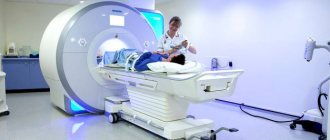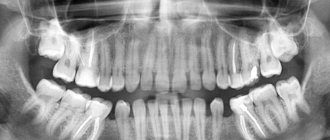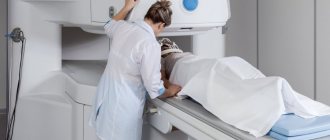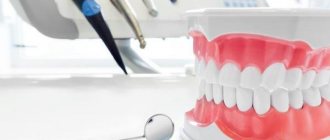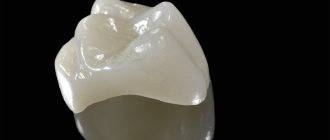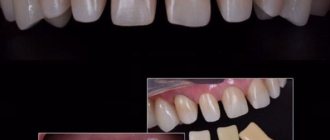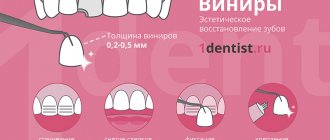Today, implantation remains the optimal solution to the problem of missing one or a large number of teeth in the mouth. Only by replacing dental roots with their artificial counterparts can you completely restore not only the aesthetics, but also the functionality of your smile, and most importantly, prevent further atrophy of bone tissue in the area of the defect.
But implantation, like any other operation, has its potential risks and can lead to complications. The use of advanced computer technologies and the use of modern materials, tools and equipment - all this made it possible to minimize the likelihood of complications.
But incorrect actions of the doctor or the patient’s dishonest attitude towards caring for new teeth can provoke undesirable consequences, which can even be called pathological. Today we’ll talk about what can cause complications after implantation and how to avoid them.
Peri-implantitis and mucositis are the most common complications after implantation
According to official statistics from the World Health Organization, currently in 2-5% of cases patients encounter such an unpleasant phenomenon as complications after implantation. Moreover, it is not at all necessary that pathological processes will begin to develop immediately after the implantation of titanium roots - problems can begin after a sufficiently long period of time.
Important information! The most dangerous period is the first year after installation of implants. If everything goes well, there is a high probability that no further problems will arise - but this will depend on you, on your awareness and care of the implants/new teeth.
One of the most common causes of complications is the spread of pathogenic microflora, inflammation and infection of tissue in the area of implanted structures. In this case, there is a possibility that one of two scenarios will develop:
- Peri-implantitis is a severe inflammatory process that covers the tissue around the implanted implant, and also provokes rapid bone resorption in the causative area. This problem most often requires complete removal of the product - this is the only way to ensure that the inflammation is stopped. In any case, you will have to undergo a full diagnosis and x-ray examination so that the doctor can assess the scale of the problem and decide how to proceed,
- mucositis is another possible nuisance, which is characterized by the spread of the inflammatory process in the gum area, that is, without further destruction of the jawbone surrounding the implant. In this case, there is a much greater chance of saving the structure, but you will need to undergo drug therapy.
Expert opinion
Kopylov Ivan Pavlovich
Expert in the field of implantology and maxillofacial surgery, leading physician at the Smile-at-Once dental clinic.
“The success of implantation depends not only on the doctor. Patients also bear quite a lot of responsibility, since much in this matter depends on how well the recovery and rehabilitation process goes. It is very important to strictly follow all the recommendations of the implant surgeon, take all medications prescribed by him and systematically attend preventive examinations to assess the process of osseointegration of artificial roots,” explains Ivan Pavlovich Kopylov, an expert in the field of implantology and maxillofacial surgery, leading physician at the Smile dental clinic. at-Once, Moscow.
Complications after implantation are most often accompanied by acute symptoms, including pain, swelling, redness, suppuration and others. In order to accurately diagnose the problem and choose the right treatment vector, the patient will have to undergo a full examination with x-rays.
How can implantation be affected by thyroid disease? What can the doctor do?
The thyroid gland produces hormones that directly affect many processes. Metabolism, cardiac activity - all this is controlled with her participation. Thyroid diseases have a negative impact on vital functions, but if corrected with medication, they are not a contraindication to implantation. If the operation is approved by the therapist who regularly monitors the person, then a date for the procedure can be set.
The postoperative period is no less important than the preparatory period. Unfortunately, even if the doctor carefully follows the treatment protocol and there are no obvious contraindications to surgery, no person can be immune from possible complications. And yet, most of the troubles arise precisely due to the fault and oversight of the doctor. These include:
- When implanted in the upper jaw, there is injury and disruption of the integrity of the septum separating the oral cavity from the nasal sinuses.
- When introducing an implant into the lower jaw, there is possible damage to the nerve trunks.
- Inflammation of the soft tissues around the implant (peri-implantitis) resulting from increased load on the gums, poor postoperative hygiene and improper implantation.
- Violation of the integrity of the structure: loosening and fracture of the screw, fracture of the implant.
Pain, swelling, and bleeding go away on their own after a few days. - A fairly common and harmless complication is swelling after dental implantation - it appears within a few hours and usually does not require additional treatment. It lasts for a week, after which it begins to gradually decrease and, as a result, disappears completely. You can speed up the process with the help of ice cubes - applying them to the operation site helps reduce pain and swelling. It is important not to overdo it: hypothermia can cause a cold. If after the specified period the swelling does not decrease, you should see a doctor - perhaps an inflammatory process has begun in the soft tissues.
- Numbness after dental implantation is a natural phenomenon if it lasts no more than 5 hours after the end of the operation. In this case, it is a consequence of too strong local anesthesia and should not cause any concern. However, it may also happen that numbness accompanies injury to the facial nerve or other nerve endings - a reason for suspicion should be a lack of sensitivity at the site of intervention that does not go away within 1-2 days. Only a dentist can make a final diagnosis and, if confirmed, he will prescribe the necessary treatment.
- Bleeding in the first days after implantation should not frighten the patient if it is not too heavy and tends to decrease. Too much blood may indicate damage to important blood vessels, resulting in hematomas.
- Pain is a constant companion of any postoperative period, and you can get rid of it by taking a special painkiller recommended by the doctor. If it lasts longer than 3-5 days, does not subside or, on the contrary, intensifies, the cause may be the onset of inflammation or nerve injury.
- But an increase in temperature is already a pathological consequence and should be a reason for consultation. Most often, it indicates an infection and requires medical intervention.
- Dehiscence of sutures can be determined by increasing bleeding and persistent pain. The reasons for this complication may lie either in unprofessional suturing or in the development of inflammation resulting from poor hygiene;
- Exposure of the implant occurs due to improper suturing and tension of the gums after the introduction of a foreign body. It does not in any way affect the functionality of the future tooth, but can have a bad effect on the aesthetic result - the consequences include deformation of the gingival curve.
You can avoid the occurrence of the listed processes by strictly following the doctor’s recommendations and prescriptions, as well as by performing daily hygienic procedures with high quality.
Symptoms of implant rejection
Since mucositis involves superficial inflammation, when it develops, the patient may notice slight swelling and redness in the area of the defect. In some cases, soft tissues acquire a bluish tint. In this case, the edge of the mucosa moves away from the walls of the crown or abutment. The X-ray image shows no signs of a decrease in the volume of the jaw bone; the implant is tightly covered with bone on all sides.
When it comes to peri-implantitis, the symptoms of the pathology manifest themselves more clearly:
- redness occurs, the gums swell noticeably,
- acute pain appears when pressing on the swelling, mobility of the implanted structure is observed,
- purulent processes occur, the gums in the implant area begin to bleed,
- the temperature rises to 38 degrees.
If after installation of the implant system the symptoms only increase, it is better to immediately contact your doctor. The sooner a problem can be detected, the easier and faster it will be solved.
When is MRI contraindicated?
An MRI is a safe procedure, but the test may not be suitable for everyone. It is contraindicated in patients with:
- pacemakers, ferromagnetic implants or devices;
- clips that regulate the pressure of blood flow in the vessels;
- tattoos made with certain types of dyes;
- electronic devices;
- pregnancy (especially the first trimester);
- claustrophobia - fear of closed spaces.
Metal objects should not be present in the MRI scanner.
Stages and forms of development of peri-implantitis
- Mild degree – the jawbone in the area of the implanted structure has decreased by no more than 3 mm. The mucous membrane is inflamed and painful, especially when pressed. At the same time, it is too late to talk about mucositis, since the X-ray image can reveal obvious signs of resorption. Treatment involves taking antibiotics and using antiseptics,
- Medium degree - the height of the bone tissue is reduced by almost half, suppuration begins, bleeding appears, and pain becomes more pronounced,
- The advanced stage is extreme atrophy with the formation of deep periodontal pockets, the appearance of bleeding, the spread of infection and the further development of the inflammatory process. The implant is already exposed.
Is it possible to do an MRI with dental implants?
The importance of warning the doctor about the presence of implants in a patient is due to the fact that they can cause distortion of the tomography result.
We suggest you read: How to remove metal-ceramic crowns from teeth
But this does not make the presence of artificial roots a contraindication for MRI. A knowledgeable specialist will be able to configure the device in such a way that the images will be as clear as possible, even with implants. To do this, you need to provide the doctor with an x-ray of the jaws, where you can easily familiarize yourself with the location of the titanium rods.
You should also be aware that distortions can only be caused by the presence of implants if the neck and head are checked on an MRI. If the chest is being examined, distortion may be minor. They will depend on the material of the crowns and the characteristics of the device used. If the lower spine and legs are examined, then no metal inserts in the oral cavity will cause damage to the quality of the images.
It must be said right away that dental implants are not contraindications for MRI. If they are present, you can safely undergo a diagnostic examination without fear that the implanted structures will move, injure bone tissue, or even be torn out of the jaw, as is sometimes spectacularly shown in movies.
The vast majority of modern dental prosthetic structures are made from special alloys that do not have ferromagnetic properties, that is, they simply do not “magnetize” and do not interact in any way with the magnetic field of the diagnostic unit. And even in the case where the implantation was carried out quite a long time ago, not the most modern designs were used and there is some proportion of ferromagnets in them, there is no need to be afraid. Under the influence of a magnetic field, such implants still do not heat up or move.
In addition, prosthetic structures are usually very well fixed during installation, so they cannot move - this is an additional guarantee of the safety of MRI in the presence of dental implants. Only non-fixed metal bodies (for example, bullet fragments) can move. Therefore, we can say with confidence that MRI and dental implants are quite compatible concepts.
There is still one difficulty with installed dental implants and MRI of the head: such prosthetic structures can cause some distortion of diagnostic images. However, in this case, installed implants are not considered a contraindication for magnetic resonance imaging.
The patient should simply notify the doctor in advance that he has prostheses installed, so that the specialist can, if necessary, adjust the diagnostic procedure taking into account the prosthetics. It is also advisable to bring a panoramic x-ray of the oral cavity with you so that the doctor can determine exactly where the dentures are installed and evaluate how they may affect the results of the study. Otherwise, the procedure for a patient with prosthetics will not differ in any way from the diagnosis of a patient without any prostheses.
Was this article helpful?
Rating: 4.7/5 — 40 votes
Share the article with your friends!
Why do complications arise after fixing implants?
Today, the risks of complications have been reduced to a minimum. So, for example, one-stage treatment protocols require careful planning of the operation with 3D visualization of the entire process, as well as the use of surgical templates for precision implant positioning.
This allows you to virtually reduce the human factor to zero and significantly increase the safety of the procedure. However, medical errors and the patient’s dishonest attitude towards following the specialist’s recommendations can all provoke undesirable consequences.
Medical errors at the preparatory stage
At the diagnostic stage, the doctor must take into account all the important nuances. For example, if a patient smokes, this creates an additional risk during dental implantation. In smokers, the soft tissues of the oral cavity heal worse and more slowly, and the osseointegration of titanium roots is also complicated. With systematic contact with tobacco smoke, there is a decrease in the production of salivary fluid, which causes dryness of the mucous membrane. Nicotine plaque on teeth creates suitable conditions for the rapid development of pathogenic microflora, which also increases the risk of developing complications in the future.
Patients with diabetes mellitus also require special attention. Today this is not an absolute contraindication, however, the presence of this pathology requires increased attention to preparation and postoperative rehabilitation. If we are talking about a woman, then we will have to take into account her menstrual cycle, which can greatly influence the success of osseointegration of titanium rods.
What may be missed during procedure planning?
Planning is a very important stage, which involves a thorough analysis of the current clinical picture, study of the condition of the bone tissue, selection of implant models and places for their implantation. It is at this stage that a decision is made about the need for bone grafting to increase the volume of bone tissue.
“A friend of mine decided to save money on implanting one tooth and went to some dubious clinic. I personally was immediately alarmed that the doctor did not send her for tests, but only asked her to take an X-ray. As a result, an implant was installed, but the bone thickness was not enough. So she then had to suffer with wild pain and inflammation. In another, already normal clinic, she had the rod removed and was treated for a long time with some drugs and procedures. Only a year later she made herself a new tooth. And I’m still silent, how much money was wasted!”
Katerina79, Rostov-on-Don, from correspondence on the forum www.32top.ru
With the advent of single-stage technologies, advanced computer technologies for 3D modeling and planning began to be actively used. The patient undergoes cone-beam or multi-slice tomography, if we are talking about the implantation of zygomatic implants, after which the data obtained is loaded into a specialized program, which itself selects the optimal points for implantation of artificial roots, determines the desired inclination and their position.
By the way, it is one-stage protocols that make it possible in most cases to refuse to build up the jawbone. This is made possible through inclined installation on the sides or the use of zygomatic implants for the upper jaw - elongated structures that are fixed in dense and sterile areas of bone tissue.
Incorrect implementation of implantation technique
The development of inflammation and subsequent rejection of the structure may result from a violation of the procedure technology. So, for example, accidental contact of the oxide surface of the implant with the external environment or even with saliva can lead to infection and inflammation.
Another common cause of the problem is the penetration of saliva into the implant bed. The danger is not only in tissue contamination, but also in getting a superficial chemical burn - saliva has a fairly aggressive composition.
Complications also develop against the background of loose fixation of the plug or gum former, if the dimensions of the bone bed do not correspond to the diameter of the implant. Sometimes damage to the artery occurs when the mucosa is peeled away to gain access to the bone mass. In any case, it is better to immediately approach the search for a good and experienced doctor responsibly than to save on the cost of treatment, but then face this kind of trouble.
Risks associated with prosthetics
The development of peri-implantitis can be caused by overloading of implanted implants with a prosthetic structure, and here we can already talk about the fault of dental technicians and prosthetists. The cause of the problem may be an incorrect crown height or a mismatch between the parameters of the top of the implant and the cavity inside the artificial tooth.
Today, some clinics are trying to reduce the cost of complex dental restoration by independently manufacturing individual abutments in their laboratories. However, such actions often cause the development of allergic reactions, damage to the abutment neck and other problems. With cement fixation, excess adhesive can easily cause inflammation of the gums.
The patient's responsibility for the success of the treatment
Sometimes complications occur due to the fault of the patient himself. Most often this occurs due to poor oral hygiene, as well as non-compliance with specialist recommendations during the rehabilitation period. But experts also identify other factors that can directly or indirectly affect the quality of engraftment of titanium rods:
- smoking,
- diabetes,
- Bruxism - unconscious grinding of teeth during sleep,
- long-term use of corticosteroid drugs,
- chemotherapy,
- osteoporosis.
The above phenomena are not absolute contraindications, but they significantly increase the risk of complications in the future. The patient is obliged to independently warn the specialist about bad habits or the presence of systemic diseases. The doctor, in turn, must take the diagnosis and identification of possible contraindications in the patient very seriously.
Can a doctor refuse implantation?
HIV is not a contraindication for implantation.
The doctor may not agree to perform the operation in the following cases:
- Lack of specialist knowledge regarding HIV implantation;
- Warning for HIV patients;
- For medical reasons for HIV disease.
What to do if treatment is refused
If you were refused for the first two reasons, then simply contact another clinic.
You don’t have to go to the clinic right away, just pick up the phone and ask about the possibility of implanting a tooth in a patient with the disease using Form 50. If they don’t understand you, then these specialists have not yet performed implantation on people with HIV infection.
Chronic disease form 50 means you have HIV.
If you understand, then it’s time to go for a consultation to assess the cost of services and necessary procedures. You will probably be asked for an extract from the AIDS center, in which the treating infectious disease specialist will indicate that implantation is not contraindicated.
How is peri-implantitis treated and is it possible to save the implant?
Moderate and severe peri-implantitis, unfortunately, cannot be treated. In 93% of cases, after therapeutic treatment, the tissue around the implant is re-infected [ii]. Therefore, most often it is necessary to resort to removal of the structure and subsequent drug treatment.
[ii] Tlustenko V.P. Dental peri-implantitis (diagnosis, clinic, treatment), 2002.
Important! Mucositis, unlike peri-implantitis, can be successfully treated with medications. In fact, peri-implantitis is also amenable to drug therapy, but only in the case of immobility of the implanted structure and slight atrophy.
Let's look at how complications after dental implants are treated today. For this purpose, the surgical method is usually used, but in conjunction with an integrated approach to solving the problem.
Removal of inflamed tissue
To begin with, the exposed part of the structure is cleaned of any kind of contaminants: inflamed and necrotic tissues, plaque, bacterial plaques. For this purpose, ultrasonic and laser equipment and the Air Flow system are used. Next, the work area is treated with an antibacterial agent. In fact, this is a complete preparation for subsequent surgery.
Antibiotic therapy
The patient is prescribed antibiotics to combat further spread of inflammation. More often, general medications are prescribed, but in individual cases, an analysis of the microflora of the oral cavity is also carried out to assess susceptibility to various types of antibiotics. In any case, taking any medications without a specialist’s prescription is strictly prohibited.
Bone grafting procedure
Next, the specialist begins the surgical stage of treatment. All inflamed tissue will need to be removed and the lost volume of the jawbone will be replaced. An incision is made on the gum, a flap of mucous membrane is peeled off and the bone in the area of the defect is exposed. Using an ultrasonic scaler or laser, inflamed areas and granulations are removed.
Next, bone replacement material in the form of crumbs or the patient’s own bone tissue, taken from the chin area or the growth area of wisdom teeth, is implanted. After filling the empty space, a protective membrane is placed over the material.
Installation of PRF plasma membranes
Some modern dental centers also use special PRF membranes. They are created from platelets that are obtained by placing the patient's own blood in a centrifuge.
Such membranes not only serve as reliable prevention of relapses, but also promote faster tissue healing, as well as restoration of the jaw bone.
Flap surgery
Correction of the shape and relief of the mucosa in the area of the defect can be performed simultaneously with the grafting of bone material or separately from it, as an independent procedure. It can be carried out purely for aesthetic reasons, in order to make the edge of the gum in the smile area smooth and natural.
Sometimes the procedure is carried out when the exposure of the top of the structure becomes a consequence of severe thinning of the gum in length and thickness.
Prosthetic device correction
The development of complications after implantation occurs due to their overload with a prosthetic device. In this case, you will have to replace the orthopedic structure or reline the uncomfortable prosthesis if the discomfort is minor.
It is very important that the adaptation system does not cause inconvenience and allows you to talk and chew food calmly.
Preliminary diagnosis, indications and contraindications
Dental implantation is performed for various indications. Implants are used if one or more teeth are missing, in which case they are installed as full dentures or as a support for other structures. In case of complete absence of teeth, implantation is carried out as an independent method of prosthetics or as an auxiliary method, when only 4–6 implants are implanted into the jaw, and other prostheses are installed on them.
Bridge prosthesis on implants
Implantation is a full-fledged operation, which is contraindicated in the presence of certain diseases and disorders, as they increase the risk of unpleasant complications. Therefore, before using implant prosthetics, the dentist examines the patient to assess the condition of his oral cavity and general health. For this, the following diagnostic methods are used:
- Examination of teeth and gums for the presence of caries, tartar, and inflammatory processes.
- Bite check.
- X-ray of the jaw.
- Blood tests for infection, clotting and sugar levels.
If the dentist suspects the presence of any pathologies of internal organs that may become an obstacle to the procedure, he may send the patient for a consultation with specialists of another profile, for example, a cardiologist, oncologist or immunologist.
Absolute contraindications to the installation of dental implants
Absolute contraindications to implantation are those factors in which surgery is strictly prohibited. These include:
- Diseases of the blood, hematopoietic organs, clotting disorders.
- Diseases of the nervous system.
- Oncological neoplasms in any organ.
- Connective tissue diseases.
- Immune and autoimmune disorders, presence of HIV status.
- Tuberculosis.
- Severe diseases of the oral cavity.
- Tendency to bruxism.
- Diabetes.
- Kidney failure.
- Congenital pathologies of the bone tissue of the jaw.
- Childhood and adolescence (up to 18 years).
Prosthetic methods related to implantology are contraindicated in the presence of such anatomical features as a small distance from the installation site of the prosthesis to the maxillary or nasal sinus.
Implantation is a serious surgical procedure that is accompanied by severe pain, so implants are not placed without anesthesia. If a patient develops an allergic reaction to anesthetics, he will have to look for other ways to solve dental problems. Individual contraindications are also taken into account: dental implants made from a material that causes allergies in a particular patient cannot be placed.
Relative contraindications to the installation of dental implants
The presence of relative contraindications to the installation of dental implants does not exclude the possibility of prosthetics. The patient can perform this procedure after appropriate treatment, provided his health condition is normalized. This group of contraindications includes:
- Local diseases of the oral cavity.
- Inflammation of the ENT organs.
- Bite defects.
- Diseases of the mandibular joint.
- Pathologies of bone tissue.
- Venereal infections.
- The rehabilitation period after another operation.
- Rehabilitation after radiation therapy.
- Taking antidepressants.
- Age over 60 years (more thorough examination required).
Dental implantation performed during pregnancy can cause harm to the unborn child, since it is a kind of stress for the mother and is accompanied by the use of various medications. Therefore, a woman should postpone prosthetics until the postpartum period, and if breastfeeding, until the end of lactation.
If a patient suffers from alcohol or drug addiction or constantly ignores hygiene rules, he must give up his addictions and return to a normal lifestyle. Then, if there are no other problems, the doctor can install a prosthesis for him. If a person does not seek to change his lifestyle and continues to cause harm to health, these contraindications to the installation of dental implants become absolute, and the dentist decides to finally refuse the operation.
When can re-implantation be performed?
If we are talking about classical implantation, then it will be almost impossible to re-install a titanium rod in the same place. Due to the inflammatory process, the jawbone atrophies very quickly, and therefore it will be problematic to secure the structure in it.
The only way out is to augment the bone tissue, but in this case you will have to wait another 3-6 months for the material to take root.
The use of one-stage treatment protocols makes it possible to virtually reduce any risk of complications to zero. Such techniques are designed for comprehensive smile restoration, so if one of the rods “fails,” the rest take over the distribution of the chewing load.
Therapeutic treatment is carried out, and if necessary, the implant is replaced with a new design. This process is not quick, since you need to make sure that the inflammation has passed and the infection has been completely eliminated.
Benefits of implantation
The implantation procedure is becoming more and more popular every year. However, many patients doubt this solution to the dental problem of a missing tooth or teeth. Despite fears and doubts, this procedure has a number of advantages:
- intervention is carried out only in the place where the tooth is missing;
- installation of elements immediately after tooth extraction;
- elimination of defects;
- reliability of design;
- positive aesthetic qualities;
- full restoration of functionality.
With conventional dental prosthetics, it is necessary to grind down adjacent teeth or remove dental nerves. This is not required when installing implants. The abutments on which the crowns are attached do not put any pressure on the gums , so inflammation of the mucous membrane is excluded. Thanks to unique alloys, modern implants are practically not rejected by the body. After implantation and installation of a tooth, the patient can eat his usual food and not experience any discomfort. High-quality dental implants last for decades, but for such quality and convenience you will have to pay a lot of money.
Implant rejection - preventive measures
To minimize the risk of complications after implantation, you will have to approach the preparation and selection of a qualified specialist as responsibly as possible. Below are recommendations from experts on how to prevent the development of unwanted consequences:
- a careful approach to diagnosis and treatment planning - you will need to undergo an X-ray examination, possibly a computed tomography scan and a multi-spiral scan, if we are talking about zygomatic implants, and pass all the necessary tests. In short, you need to make sure that you do not have any risks or contraindications,
- if there are signs of inflammation of periodontal tissues, choose one-piece implants with a smooth neck and antimicrobial coating to prevent further spread of pathology. But this solution is usually used only for cases of complete edentia. If you still have your teeth and they are in satisfactory condition, it is recommended to undergo comprehensive periodontal treatment and only then begin preparing for implantation,
- if it is planned to implant two-part implants, then preference should be given to models with an antimicrobial coating at the base of the structure body and abutments with a smooth antibacterial surface,
- The patient will be required to strictly follow all instructions from their attending physician. It is important to follow all the precautions: give up hard and sticky foods for a while, try to chew on the other side of the causative area, avoid intense physical activity, flights, and visiting baths and saunas. You should also take all medications prescribed by your doctor.
The main thing in this matter is to choose a good specialist with sufficient experience, knowledge and skills. If we are talking about one-stage treatment protocols, then increased demands are placed on practitioners.
The specialist must be fluent in dental implantology, maxillofacial surgery and prosthetics, undergo advanced training, obtain all the necessary permits and certificates to work with premium brand implant systems, and be able to work in advanced computer programs for 3D modeling and planning.
When not to place implants
Teeth installed through implantation are designed to improve the quality of chewing food, which is impossible in the absence of teeth. This factor has a direct impact on the proper functioning of the gastrointestinal tract.
Also, implants, unlike removable dentures, eliminate possible psychological inconveniences (appearance and daily fixation).
The basis of artificial teeth are biological components, which is why the implantation of the structure occurs without complications. They are used as fasteners for conventional dentures.
During implantation, there is a chance to strengthen natural teeth when they begin to become loose.
People who need dental help, and especially with regard to implantation, experience extreme fear of this action. But there is no point in being afraid, since the latest anesthetics provide sufficient pain relief for the gum perimeter during manipulation.
The only thing the patient will feel is the touch of the dentist’s hands.
People who are thinking about how to improve their smile by installing a denture structure often hear all sorts of lies from others dissuading them from the procedure.
Common myths include:
- Damage to the eye orbit.
- Excessive pain.
- Anesthesia using anesthesia.
- Long-term healing of the surgical site.
- Rejection of implants with the development of gangrene.
Invasion of implants into the orbit of the eye is really impossible for several reasons: the length of the implanted implants is selected taking into account the characteristics of the patient’s facial structure, the experience and knowledge of the dentist.
At the same time, there are exceptional cases of implants passing into the maxillofacial apparatus.
Some of the complications encountered may include: perforation of the maxillary sinus, damage to the nerve of the mandibular localization, exit of an artificial tooth into the sublingual region and nasal cavity.
These complications are recorded extremely rarely, and the most common possible complication is the entry into the maxillary sinus.
Recently, such cases practically do not occur due to the special care in the preoperative examination through comprehensive hardware images and sinus lifting (building up additional bone tissue).
Anesthesia during the intervention period during dental implantation is similar to pain relief during the removal process. The only difference is the sequential freezing of the necessary jaw fragments.
Modern anesthetics are created in order to individually approach the characteristics of a particular human body, choosing from a variety of pain relief methods to achieve 100% results.
In cases where there are contraindications to local anesthesia or anesthesia, the patient’s consciousness is often switched off.
An important advantage of this method is the absence of pain and difficult emotions from the sight of dental instruments, blood and specific sounds.
It should be noted that in most cases, dental implantation is carried out under local anesthesia, when the patient sees everything and is aware of what is happening, one way or another, controlling the process.
The use of anesthesia becomes an alternative method of anesthesia if local anesthesia does not have the desired effect or is contraindicated for administration to a particular patient.
Also, anesthesia as a pain reliever is used due to the persistence of the person himself. But here it is important that those who apply voluntarily talk about the presence of diseases when collecting anamnesis, because concealing them threatens the development of complications or even mortal danger.
When the anesthetics wear off, there may indeed be slight bleeding, pain and slight swelling.
A qualified implantologist will prescribe the necessary medications to eliminate the unwanted reaction of the human body.
Occasionally, prolonged pain, severe bleeding and swelling occurs, as well as numbness of the jaw, increased temperature, bad breath and a purulent process.
Such situations occur due to the doctor’s incorrect tactics. But such signs are dangerous, which requires an immediate visit to the dentist.
When making a decision about transplantation, you should under no circumstances listen to advisors who frighten you.
DETAILS: Cost of services and prices - Dentistry Poltava-Dent. Kyiv.
. Since this cannot happen even in conditions where the dentist made a number of mistakes during the operation. The maximum that is revealed during implant rejection is inflammation and a purulent process at the beginning, which causes a person to experience severe pain, which will force him to seek help from a specialist.
In those rare situations when rejection occurs after dental implantation, a decrease in bone tissue is noted. As a rule, this deficiency is compensated for by artificial bone material.
After all the results of the tests have been received, contraindications have been excluded, and the oral cavity has been prepared for dental implantation, you can confidently go to an implantologist without any doubt or fear.
As you know, these are non-removable structures that artificially complement the dentition. Contraindications to dental implants also have relative and absolute parameters. Before giving the go-ahead for prosthetics, the dentist must conduct a detailed examination of the oral cavity and promptly identify hidden pathologies.
In this case, restrictions on the operation are conditional, and the patient is temporarily at risk. If you violate generally accepted rules and place implants, the foreign material is rejected, and the healing of the dentition is noticeably delayed. Dental implantation is not recommended if the following contraindications exist:
- infectious and inflammatory pathologies of the oral cavity;
- pregnancy period;
- lactation.
If there is a lack of personal hygiene rules in a patient’s life, at a certain moment, and the most unexpected one, the doctor diagnoses caries. Such an abnormal process and the growth of pathogenic flora require the immediate participation of a dentist, followed by the prescription of bactericidal and antimicrobial drugs.
- infection of the oral cavity;
- penetration of purulent masses into the systemic bloodstream;
- inflammation of the facial nerve and jaw.
To solve the global problem of lost teeth, you need to promptly seek advice from a competent dentist. The presence of contraindications for dental implantation eliminates a number of interested patients. In order not to indulge yourself with empty hopes, you need to know what the general limitations stated in modern medicine are:
- pregnancy and breastfeeding;
- caries in the relapse stage and inflammatory processes of the mucous membrane;
- intolerance to local anesthesia (medicine);
- contraindications by age category;
- exacerbation of chronic diseases of the body.
- HIV infection at any stage of development.
- Oncology: malignant tumor, cancerous formations or lumps, sarcoma, neoplasms in the metastatic stage.
- Metal intolerance.
- Any blood diseases (thalassemia, leukemia, lymphogranulomatosis and others).
- Somatic pathologies of chronic course: tuberculosis, diabetes, diseases of the oral mucosa.
- Diseases of the immune system that will interfere with tissue healing: polymyositis, thymic hypoplasia and others.
- Ailments associated with the condition of connective tissue: lupus erythematosus, scleroderma, rheumatic and rheumatoid diseases.
- Hypertonicity of masticatory muscle tissue, bruxism.
- Diseases of the mucous membrane: Sjogren's syndrome, pemphigus, aphthous stomatitis.
- Endocrine disorders: abnormal state of the adrenal glands, pituitary gland, hypothyroidism, hypoparathyroidism, hyperthyroidism, hyperparathyroidism.
- Problems with bone tissue regeneration: dysplasia, osteoporosis, osteonecrosis, osteopathy.
- Diseases associated with the heart and blood vessels.
- Mental disorders: schizophrenia, paranoia, dementia, psychosis.
- Alcohol and drug addiction in the final stages.
When determining the feasibility of implantation, the doctor takes into account the balance between the benefits of the treatment, the risk of complications and the possible danger to the patient’s health. If, compared to the improvement in quality of life, possible complications are not so significant, implantation can be performed. If not, it is necessary to consider alternative prosthetic methods.
Problems caused by the patient himself
Quite often there are situations when unpleasant consequences and complications arise after successful installation of the implant, and through the fault of the patient himself.
It is imperative to follow your doctor’s recommendations for oral care after implantation. Insufficient hygiene can lead to infection - first of the gums, and then of the bone tissue.
In particular, peri-implantitis sometimes occurs, which is fraught with serious consequences.
In addition to care recommendations, you should strictly follow all medical instructions and visit the doctor as scheduled. This will reduce the risk of possible problems and extend the life of the implants.
